“Believe In Yourself As An Artist” Interview With Filmmaker & Cinefemme CEO Michelle Kantor
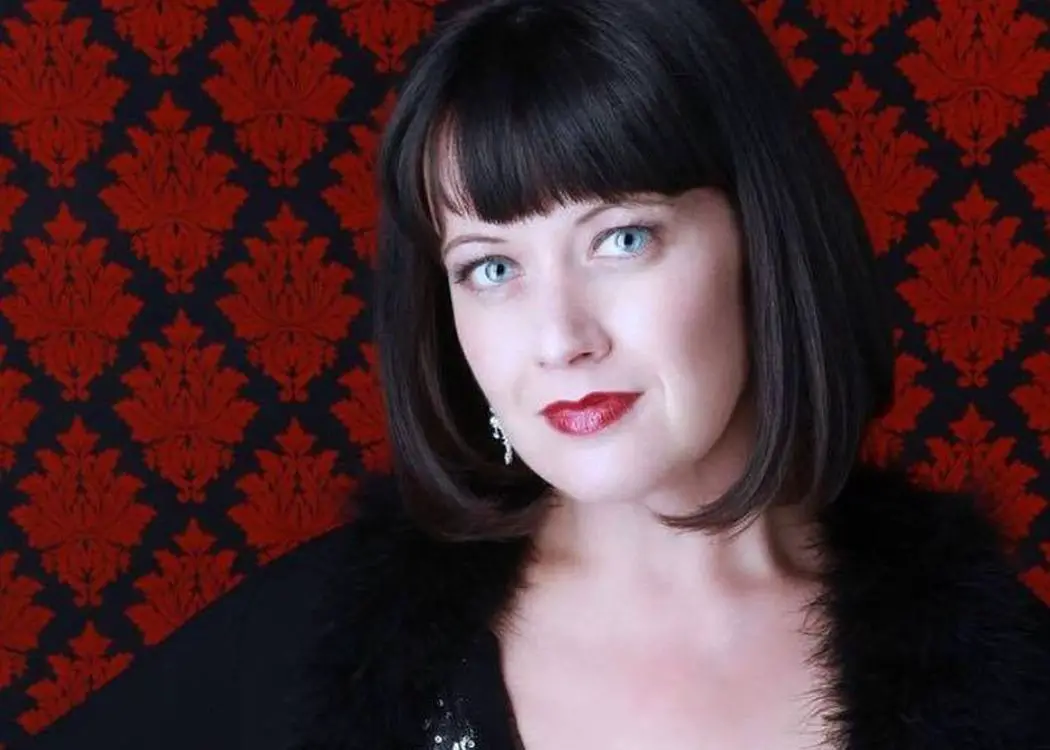
Manon de Reeper is the founder and CEO of Film…
You may have noticed that over the past three months, we’ve been posting recaps of the mentorship series Dinner With Dames nights (recap 1, 2 & 3), organised by Jenna Payne of Cinefemme. Behind the non-profit organisation Cinefemme is a great group of primarily women, who aim to improve chances for women filmmakers and artists in Hollywood by providing fiscal sponsorship, organise networking events and offer support. Cinefemme is an interesting organisation – women filmmakers should definitely take note!
We caught up with founder and CEO Michelle Kantor of Cinefemme, who answered some of our questions about the organisation.
How did you come to found Cinefemme?
Cinefemme was born in the rebellious, independent spirit of San Francisco, long before the current zeitgeist of feminist filmmakers fighting for systemic industry change. I was a graduate student at San Francisco State University, a top film school, preparing to shoot my thesis film Bettina in the Fog. I started brainstorming with two of my classmates, Katrina Parks and Sirpa Nelson, about our post-graduation prospects as directors and filmmakers.
We researched the statistics and knew the odds were stacked against us: at that time, women comprised less than 5% of key creative roles in Hollywood. We refused to accept a scenario that inherently did not value women directors and decided to green light ourselves. In 2002, we created a 501c3 non-profit organization to help women filmmakers get their projects made.
We are one of few non-profits with a fiscal sponsorship program specifically for women filmmakers. Qualified non-commercial projects with women in key creative roles (primarily directors, but also producers and writers) can solicit donations under our umbrella, whereby funds raised are tax-deductible to the extent of the law. In 2007, I took over as Executive Director and have personally worked with dozens of independent filmmakers, festivals, websites and new media projects.
How has Cinefemme grown and evolved over the years?
During our San Francisco years, we held screenings, fundraisers, panels, and hosted creative salons. We had a high school mentorship program, an after school educational program for elementary students called Cinekids, and an annual film show with a successful run at the Museum of Contemporary Art in San Diego. When my daughter was born, I took a career hiatus to focus on motherhood and after moving to Los Angeles, started to grow our presence in Hollywood.
I tapped into something amazing: a potent network of women disruptors, many of whom are also entrepreneurs and heads of their own businesses or organizations. Just as I came back to the filmmaking scene, the zeitgeist I’d always imagined had finally arrived. Cinefemme is currently on the precipice of major growth. For years, we functioned as a boutique operation directly supporting small batches of women filmmakers and soon we are significantly expanding to welcome a large community of women filmmakers who need our support. I believe strongly in inclusion and embracing the marginalized.
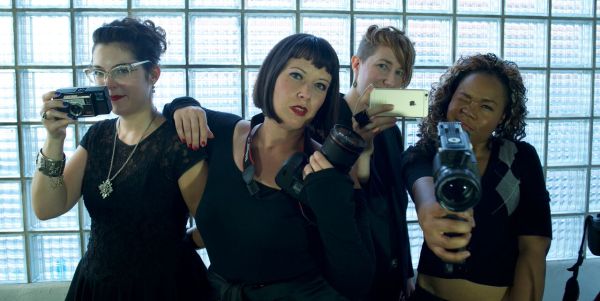
People need agents of change now more than ever. The Cinefemme brand is geared towards fearless women who are not afraid of standing up for truth, themselves, or each other. We’re edgier, a little punk rock, and are having fun creating the future we want to see for women in the film industry. We are adaptable and non-corporate. We are aware of our own power. Some of our programs were pitched to me and executed by hardworking, ambitious women who had a great idea and wanted to partner with us to bring it to life. We see this as a potentially global initiative that can embrace women (and women-identifying) key creatives in communities like Hollywood and beyond. We are driven by inclusivity and kindness.
Disenfranchised people are feeling especially wounded right now, and Cinefemme provides an inclusive space to champion all women filmmakers, including women of color, LGBTQ, gender non-binary, mothers, people with disabilities, and others who may not necessarily fit the standard mold. There will be a rise of artists propelling diverse narratives into the mainstream, compelled to speak the truths of their communities.
What programs do you offer?
Our current programs include Fiscal Sponsorship, the VIP mentorship series Dinner With Dames, creative salons, and our networking and relationship-building programs in Los Angeles, including the Violet Vesper Hour and co-branded events. These meet-ups ultimately lead to women collaborating, hiring each other, and making inroads together.
We have a new official podcast coming, pipeline initiatives in the works and vendor discounts, including the female-owned Tikkun Holistic Spa!, plus many more irons in the fire. I’m excited to bring more ideas and energy to the table. We will have a lot of exciting news to announce in 2017, so definitely stay tuned.
Do you feel the Hollywood landscape is changing for women? If so, how?
Hollywood is changing because we are changing it. There is a reckoning happening in which the Hollywood patriarchy, and by extension all of us, are confronting our historical sins of disenfranchising half of our populace. We owe a great debt to activist Maria Giese (a Cinefemme Advisory Board Member) who effectively fell on her sword in order to force systemic change for the greater good. Her landmark documentation of discrimination against women directors in the DGA and subsequent ACLU and EOCC filing is the spark that motivated studios and other powerful entities to change their ways.
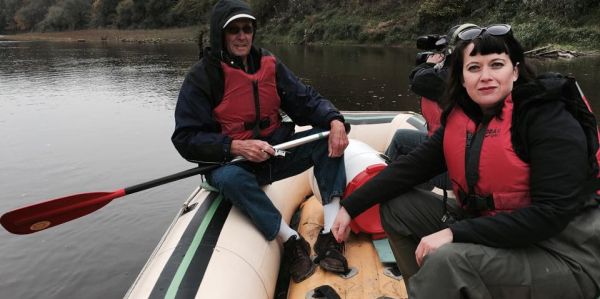
We must remember the previous waves of feminism, which tended to spike and then drop back to status quo (or worse). Elitism fixes us in a continuous competitive paradigm, which continues to marginalize women. We need to work together to see how our own conscious and unconscious cognitive bias hardwires us to fight other women for the top shelf crumbs, and choose differently. We need to hire each other and help women get hired. We need to rebuild the cinematic culture in a way that seeks out diverse voices and helps women artists make a viable living at their craft.
We need to build bridges of sisterhood across the generations, so we can continue passing the mantle of activism down and never see it die down again. We need to hold the upper tier’s feet to the fire to fill key creative roles equally with women.
What can we expect from Cinefemme in the future?
Cinefemme will continue forging a disruptive path forward that blazes a trail for women filmmakers with our innovative programs, expanding networks, growing communities, and increasing access to opportunities. Our goal is to bridge the gap between independent women filmmakers and the inner circle of the industry, humanizing a real issue we face as women in Hollywood.
Cinefemme’s women are our greatest resource and we will continue to empower their ideas, serving as social emissaries changing hearts and minds across the board. Because there is a limit to the projects we can fiscally sponsor (it’s a lot of volunteer work!), we will seek out as many diverse voices as possible. We are half the population and should participate equally in the cultural narrative and storytelling of our civilization; otherwise, it’s just another white man’s retelling of history that erases our individual contributions to the whole.
What does your work involve as Fiscal Agent?
Running a fiscal sponsorship program is very much like producing, although we do not actually find donations, funds or grants for individual projects. When I’m offered a producing credit for my work in this department, I seriously appreciate it, because fiscal sponsorship is a ton of work! It’s the type of unglamorous behind-the-scenes, in-the-trenches work that is also incredibly vital. It’s also one of the reasons why I enjoy glamming it up for our events, quite honestly.
Because I’m also a certified paralegal in the state of California, my detail-oriented experience in the legal field helps with paperwork, maintaining logistics, filing, management and communications. I’m the main POC at this time and process applications, review eligibility, draft contracts and letters of support, answer emails back and forth, upload project and filmmaker profiles to the website, and consult with filmmakers. There’s a lot of work done with various government agencies, IRS, and Treasury Departments to maintain our 501-c3 status on an annual basis, and even more work when it comes to certain government grant applications.
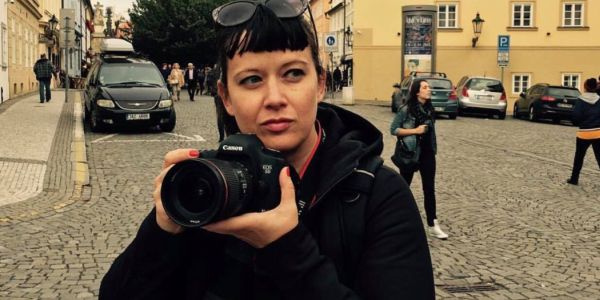
I also cash a lot of checks, check our P.O. Box, meet with bankers, forward Paypal donations, manage staff members, communicate with filmmakers, help with marketing, graphic design, program management, business development, and oversee disbursements. There are probably more many duties I’m not recalling at this time. Jenna Payne, who also works as a line producer professionally, is my fabulously talented right-hand woman in this department and she helps with accounting, disbursements, donor tax letters, among other things.
I keep our fiscal agent fee fairly low to allow filmmakers to keep more of their funds, so the revenue generated from this program isn’t nearly enough to compensate for the work involved. In truth, I often am juggling several other freelance jobs in order to keep Cinefemme going. We all are. To alleviate our funding issue, we are seeking corporate sponsors and public donations to Cinefemme’s administrative fund. Generous people who’d like to support our organization can make a tax-deductible donations here, or else send a check made out to Cinefemme (with “Admin” in the memo field) to: Cinefemme at 1507 7th St. #477, Santa Monica, CA 90401.
We’ve done so much with very little resources – I can only imagine what we’d accomplish with substantial support! We sincerely appreciate the help to continue our hard work.
I noticed Emily Best of Seed & Spark is on your board of directors – we love Seed & Spark. Could you tell us a little about your collaboration with them?
We love Emily and her fantastic team at Seed and Spark! They are also a mission-driven, female owned company, with the similar goal of reaching financial independence and sustainability through the crowd-funding and audience-building disruptive model. Fiscal sponsorship fits beautifully into this system that favors independence over elitism. It’s important to bring like-minded innovators to your table, and I was thrilled when Emily joined our board and braintrust.
Although we have partnerships with other platforms, I encourage filmmakers to support the good people at Seed & Spark by offering a lower fiscal agent fee for campaigns done through them. Since I crowdfunded on Seed and Spark, I’m able to offer consultations to our fiscal sponsorees about crowdfunding.
We will also be launching a Cinefemme channel on Seed and Spark, quarterly blog, and are cooking up some #FilmCurious Twitter chats in the new year. By partnering with like-minded disruptive companies, such as Seed and Spark, indie women filmmakers can truly create a new sustainable independent ecosystem for themselves.
Could you also tell us a little bit about the other partners and how you work together?
There are many amazing grassroots women’s organizations, and I wish more of them received the mainstream media attention they deserve. Some of our partners include Film Powered (which our members get to join), Looptown (with whom we’re scheduling ADR/looping sessions), Artemis Film Festival, Etheria Film Series, LA Femme Film Festival, Women in Media, Seeking Our Story, Ms. In the Biz (for whom I’ve written several articles), Blue Fever, Big Vision Empty Wallet, and Kuula, a 360/VR platform. We also have partnerships with sister organizations such as AWD, WIF and Film Fatales.
Our primary directive is getting access for Cinefemmes, and supporting, amplifying, advertising, and co-sponsoring events with our partners, in whatever capacity they need. This includes spreading the word about their news via social media and co-branding or hosting events, screenings, and panels together. Without institutionalized support from the industry, we are instead supporting, recognizing and valuing each other. The larger our collective network grows, the more effective we become.
If you take a good look at the grassroots movement in Los Angeles right now, it’s pretty remarkable. When needs arise, people ask for help and others step up to the plate. Again, there is strength in numbers!
Which of Cinefemme’s achievements are you most proud of?
I’m proud of our vision and longevity. Cinefemme started when there was nothing, a little bit ahead of our time, and is now blossoming. We received a grant from the Silicon Valley Community Foundation, and in return, we awarded a $1000 scholarship to a female graduate student at San Francisco State University for her thesis project. I felt so proud to stand before my alma mater and be in a position to give back.
I’m proud of getting the amazing VIP’s who are hosting Dinner With Dames, and the incredible people on my staff and board who work so hard on this shared mission. I’m thrilled to support the dozens of fiscal sponsorees making their visions come to life. Our filmmakers are rock stars. Studios and production companies looking to hire can find an incredible talent pool of women directors, producers, and writers within our very own organization.
Cinefemmes are documenting women’s history with Katrina Parks’ The Women on the Mother Road, Alka Raguram’s Burqa Boxers, and Emmy Award-winning filmmaker Sarah Moshman’s Losing Sight of Shore. You’ll see true diversity in action with Sade Oyinade’s all-female crew in Yemi’s Dilemma. The outstanding producing and directing team behind The Great Silence (Kristen Murtha, Jenna Lyng, Charlie Buhler) turns expectations of genre filmmaking on its head. Bluestocking Film Series focuses on complex female protagonists and The Director List is a proven agent of change.
Our amazing projects and programs are proven to make a real difference in people’s lives. We recently had a Dinner With Dames with an executive at TLC, and a few women left the evening ready to pitch their projects to the network. That kind of access is phenomenal. Our trajectory will only go up from here. How cool will it be when a Cinefemme wins an Oscar for a project that started with us? We have some formidably talented women making films with us, it can happen.
Can you tell us about your own work as a filmmaker?
I’ve had a very colorful road leading me to this point. My father took me to my first film when I was two months old, the western Pale Rider, passing down his love of movies and photography to me. In college, I discovered experimental film at the University of Colorado, Boulder, where the late Stan Brakhage mentored me in hand-painting celluloid.
Cinema is a type of alchemy in which the best artists can transform energies, emotions and images into a profound cinematic experience, and I definitely have ideals for its potential. I made several experimental narrative short films, and won the Goldfarb Award for Best Student film for The Redemption. The following year, I made a cynical black comedy about a man who is born with the voice of a movie announcer, who suffers major disenchantment with Hollywood after a successful career.
Man and The Voice was also shot on film, and it marks the first and only time I ever had a seizure while filmmaking (in the edit room, the night before graduation). I was diagnosed with epilepsy at age 13, and although I now only have grand mal seizures once every decade, epilepsy has had a big influence on my life (Bettina in the Fog). As a professional director and epilepsy advocate, I hope to dispel antiquated myths or social stigmas.
Antipodiste is a documentary commissioned by a troupe of French circus brothers who literally juggle each other with their feet. Shooting at a vaudeville cabaret lead to more collaborations, including Highway To Hell (forever cementing my name with “Yodeling Dominatrix” in Google searches) and for which I won Best Music Video at La Femme Film Festival in 2014. I’m currently finishing a music video for my cousin Tara Savelo, a fine visual artist who toured with Lady Gaga for six years.
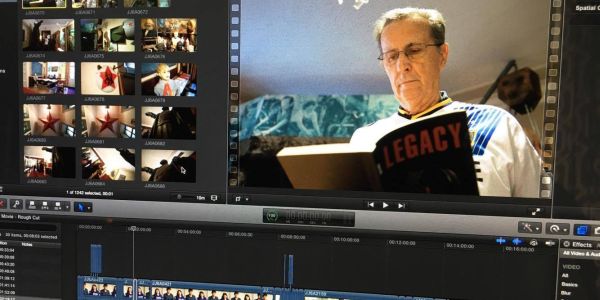
Last year, I successfully raised $25,000 on Seed and Spark for my first feature film Red Star, a documentary about my father’s historic escape from Communist Czechoslovakia by scuba diving into the free West. The film just wrapped 2nd unit production with only a few interviews left to shoot. Principal photography took place over two weeks in the Czech Republic, Slovakia and Austria and I’m currently editing over 100 hours of footage and raising finishing funds here.
My Cinematographer Kimby Caplan and I comprised the primary skeleton crew documenting my father and mother around Eastern Europe, as they retraced their lives under Communism. It was quite the surreal, often hilarious Bohemian experience that often involved goats, brief nudity, and graphic language not suitable for children. Kimby, who had a newborn baby at home, was also constantly pumping breast milk during production, a small testament to how much harder women often have to work.
We received the endorsement of LA Galaxy’s Baggio Husidic and I directed an episode of Galaxy Confidencial for Time Warner Cable Deportes. I’m also developing The Rebel, a narrative version of my father’s life story, as feature length film script (here’s looking at you, Ryan Gosling) and/or television series. Ultimately, my dream is to create a canon of auteur films that is specific to my style and vision. We do not credit enough female filmmakers as auteurs and that needs to change. Women are equally capable of being creative visionaries.
What advice would you give (young) women aspiring to become filmmakers?
Believe in yourself first. Believe in yourself as an artist. We are artists who have chosen a commodity-based industry. I still get more rejections than offers. It makes you a stronger person who does not take success or small kindnesses for granted. You have to push through the hard times and rejections, and protect the sensitive part of you that makes your artistry possible.
You learn to become two people inside– a business person/entrepreneur, and a creative/artist – and you figure out how to succeed by trial and error. If you don’t know something, Google it until you find the answer you need. Teach yourself how to stay motivated. Remember you are important and you are not alone. You are the zeitgeist.
Does content like this matter to you?
Become a Member and support film journalism. Unlock access to all of Film Inquiry`s great articles. Join a community of like-minded readers who are passionate about cinema - get access to our private members Network, give back to independent filmmakers, and more.
Manon de Reeper is the founder and CEO of Film Inquiry, and a screenwriter/producer. Her directorial debut, a horror short film, is forthcoming in 2021.













